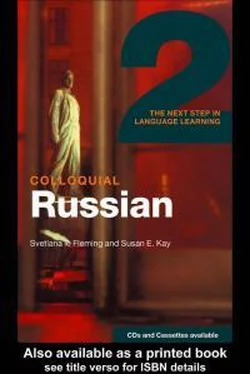40
primoŕskaq dere´vnq). 3 Vy xoti´te idtińa (sovremeńnaq angli´jskaq 1
p;eśa) iĺi (klassi´heskaq ruśskaq o´pera)? 4 (Vsq nedeĺq) my egońe 421111
vi´deli. 5 My eźdili vo (Frańciq) na (meśqc). 6 My vstre´tili
10
|
Russia and the Russian language
The Russian White House, home of the parliament or Duma.
Photo: N. Kay
(va´wa sestra´) u vxo´da v (tea´tr). 7 Leńin perene¨s (ruśskaq stolića) v (Moskva´). 8 (Kto) vy vi´deli? 9 My o´hen; xorowo´ (on) znaém.
The genitive case
Uses of the genitive case
1 The genitive is the only case ending which English retains on nouns. It is the -’s ending used to denote possession. Similarly, in Russian, the genitive indicates possession or translates ‘of ’.
Pu´tin – prezideńt Rossií.
Putin is the President of Russia.
Rol; prezideńta o´hen; slo´'naq.
The President’s role (role of the President) is very complex.
2 The genitive is also used after a very large number of prepositions: bez ‘without’; vdol; ‘along’; vne ‘outside’; vnutri´ ‘inside’; vperedi´ ‘in front of, before’; vmeśto ‘instead of’; vo vre´mq
‘during’ (named events in history); voźle ‘by, near’, vokru´g
‘around’; v teheńie ‘during’ (with words such as nedeĺq ‘week’
Rossiq i Russkij Qzyk
|
11
1111
or god ‘year’, indicating periods of time); dlq ‘for (the sake of)’; 2
‘do ‘up to, until’ (time or place); iz ‘from, out of’; iz-za ‘because 3
of, from behind’; iz-pod ‘from under’; kro´me ‘except’; mi´mo ‘past; 4
napro´tiv ‘opposite’; o´kolo ‘around, near’; ot ‘from’; pośle 5
‘after’; pro´tiv ‘against’; ra´di ‘for the sake of’; s / so ‘from’; sredi´
6
‘among; u ‘by, near, chez ’:
7
vo vre´mq perevoro´ta
8111
during the coup
9
10
pro´tiv prezideńta
1
against, opposed to the President
2
ra´di Bo´ga
3
for God’s sake
4
5
do raspa´da Sove´tskogo So[
źa
until the collapse of the Soviet Union
6
7
by
ĺi tańki vokru´g Beĺogo do´ma
8
there were tanks round the White House
9
More detailed information is given about iz-za in Unit 7, about 20111
the differences between iz, ot and s in Unit 5 and between s 1
and so in Unit 12.
2
3
The preposition u + genitive ‘in the possession of’ is used to trans-4
late ‘to have’ into Russian:
5
U prezideńta byla´ bol;wa´q vlast;.
6
The President had great power.
7
8
Note that bol;wa´q vlast; is the subject of this sentence; liter-9
ally ‘Great power was in the possession of President’.
30
3 The genitive singular is used after o´ba / o´be ‘both’ and the numerals 1
dva / dve ‘two’; tri ‘three’; hety
ŕe ‘four’ and compounds ending
2
in those numerals. The genitive plural is used after all other 3
numerals, except for odiń / odna´/ odno´/ odni´ ‘one’, which is an 4
adjective agreeing with the noun it describes.
5
6
dva´dcat; tri hleńa Du´my
7
twenty three members of the Duma
8
pqtna´dcat; hleńov Du´my
9
fifteen members of the Duma
40
1
There is much more detailed treatment of cardinal numerals in 421111
Unit 9.
12
|
Russia and the Russian language
4 The genitive is used after expressions of quantity such as mno´go
‘a lot’; maĺo / nemno´go ‘a little, few’; neśkol;ko ‘several’, skoĺ;ko
‘how many’; bol;winstvo´ ‘the majority’, and on its own as a partitive genitive, to indicate part of a substance or ‘some’: Poli´tika vyzyvaét maĺo intereśa v Rossií.
Politics arouses little interest in Russia.
My vy
´ pili vina´
We drank some wine
contrast:
My vy
´ pili vino´
We drank the wine
5 The genitive is found in several negative constructions: after net / ne´ bylo / ne bu´det ‘there is not / was not, will not be’: U Gorbahe¨va ne´ bylo kompeteńtnyx sove´tnikov.
Gorbachev did not have competent advisers.
V tako´j situaćii net drugo´go vy´xoda.
In such a situation there is no other way out.
after ne vi´dno / ne sly´wno / ne zame´tno ‘cannot be seen / heard /
discerned’:
Beĺogo do´ma ne vi´dno ots[
´da.
The White House cannot be seen from here.
as the direct object of negative verbs:
Gorbahe¨v ne imeĺ poddeŕ'ki sredińaro´da.
Gorbachev did not have support among the people.
However, when the object is more concrete, the accusative is preferred:
Q ne vi´'u ego avtomobiĺ;.
I don’t see his car.
There is much more detail about the negative in Unit 13.
Rossiq i Russkij Qzyk
|
13
1111
6 The genitive is also used as the direct object of certain verbs: 2
'ela´t; (po-) ‘to wish’; dostiga´t; / dosti´gnut; ‘to achieve’.
3
Expressions such as shastli´vogo puti´ ‘bon voyage’ are in the 4
genitive because the verb 'ela´t; is understood. Some other verbs 5
take either the genitive or the accusative: boq´t;sq ‘to fear’; 'dat; 6
‘to wait for’; iska´t; / po- ‘to seek, look for’; o'ida´t; ‘to expect’; 7
Читать дальше












